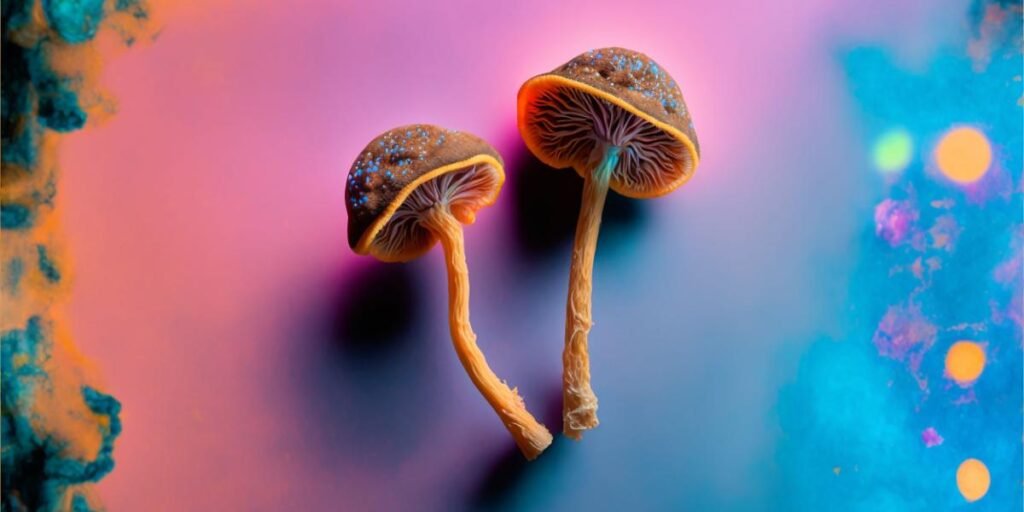In recent years, there has been growing interest in the use of psychedelic mushrooms as a potential treatment for mental health conditions like depression, anxiety, and post-traumatic stress disorder (PTSD). These mushrooms, which contain the active compound psilocybin, are being studied for their profound effects on the brain and their ability to alter consciousness. As the therapeutic use of psychedelics gains momentum, research is drawing comparisons to other natural remedies such as various strains of weed used in medicinal contexts.
The Science Behind Psilocybin
Psilocybin, the psychoactive component in certain mushrooms, is converted in the body to psilocin, a compound that interacts with serotonin receptors in the brain. This interaction is thought to lead to the mind-expanding, perception-altering experiences known as “trips.” However, beyond recreational use, psilocybin has shown promise in altering patterns of thought and emotion in ways that can reduce symptoms of mental illness.
Unlike traditional treatments for depression and anxiety. Which often involve daily medication, the therapeutic use of psychedelic mushrooms can be more profound. In clinical trials, patients who received psilocybin-assisted therapy reported a reduction in symptoms after just a few sessions, with effects lasting for months. This contrasts with the ongoing use of medications like SSRIs (selective serotonin reuptake inhibitors), where patients often have to deal with side effects and diminished effectiveness over time.
Psilocybin for Depression
Depression affects millions of people worldwide, and conventional treatments often fall short for those with treatment-resistant depression. Research on psilocybin has shown it can provide relief where other treatments fail. A groundbreaking study by Imperial College London found that two doses of psilocybin, combined with psychological support, led to significant reductions in depressive symptoms.
One of the key ways psilocybin works in treating depression is by promoting neuroplasticity, the brain’s ability to reorganize itself by forming new neural connections. This can help patients break free from the negative thought patterns that often trap them in cycles of depression. The experience is likening to a “reset” for the brain, helping individuals see their circumstances from a different perspective.
This breakthrough in psychedelic therapy has drawn comparisons to the medicinal use of different strains of weed, which have long been used for their calming and mood-lifting properties. Just as certain strains of weed can provide relief from depression through their cannabinoid content, psilocybin offers an alternative path by targeting serotonin receptors in the brain.
Psilocybin for Anxiety
Anxiety disorders can be debilitating, and traditional treatments like cognitive-behavioral therapy (CBT) or medications often do not provide long-term relief. Psilocybin, however, offers a unique approach to treating anxiety, especially for individuals facing end-of-life distress or generalized anxiety disorder (GAD).
In a study conduct by Johns Hopkins University, cancer patients suffering from anxiety and depression due to their terminal diagnoses were given psilocybin. The results were remarkable—many patients reporting reduced anxiety and an increased sense of well-being that lasted for months after their treatment. Psilocybin appears to help people confront and accept difficult emotions, reducing the fear and worry that can fuel anxiety.
Much like how various strains of weed are tailoring for different effects—some for relaxation, others for energy—psilocybin works on a psychological level, helping patients confront their fears and anxieties in a controlled, supportive environment.
Psilocybin for PTSD
Post-traumatic stress disorder (PTSD) is a challenging condition that can be difficult to treat with conventional therapies. However, psychedelic mushrooms have shown significant promise in helping people process and heal from trauma. By promoting altered states of consciousness, psilocybin allows individuals to revisit traumatic experiences in a therapeutic setting, with reduced emotional charge and increased understanding.
One way psilocybin may help those with PTSD is by interrupting the brain’s habitual response to trauma. This is akin to how different strains of weed can ease anxiety or pain by interacting with the body’s endocannabinoid system. While cannabis can offer temporary relief from symptoms. Psilocybin goes a step further by potentially addressing the root cause—allowing patients to process trauma in a new light and make lasting psychological shifts.
The Future of Psychedelic Therapy
As research into psychedelic mushrooms continues. It’s clear that psilocybin could revolutionize the way we treat mental health conditions like depression, anxiety, and PTSD. While traditional treatments often involve medications that merely manage symptoms, psilocybin-assisted therapy offers the possibility of deep, long-lasting healing.
Also Read: Anxiety Disorders and Depression Treatment Market Analysis Forecast Report 2024-2032
While strains of weed continue to be exploring for their therapeutic benefits, psilocybin stands apart for its ability to foster meaningful psychological change. With more clinical trials underway and increasing interest from the medical community, psychedelic therapy may soon become a mainstream option for those seeking relief from mental health struggles.
Conclusion
As we explore the potential of natural substances like psychedelic mushrooms and strains of weed, it’s clear that both have roles to play in the future of mental health treatment. Psilocybin, with its profound effects on the mind, has the potential to help those suffering from depression, anxiety, and PTSD in ways traditional therapies cannot. As the stigma around psychedelics fades and more research is conducting, the therapeutic use of psilocybin may become a vital tool in the fight against mental illness.







More Stories
Single-Use Bioreactor Market Size, Share, Trends, Report 2024-2032
Ivermectin and Food: Key Considerations
South Kazakhstan Medical Academy for MBBS